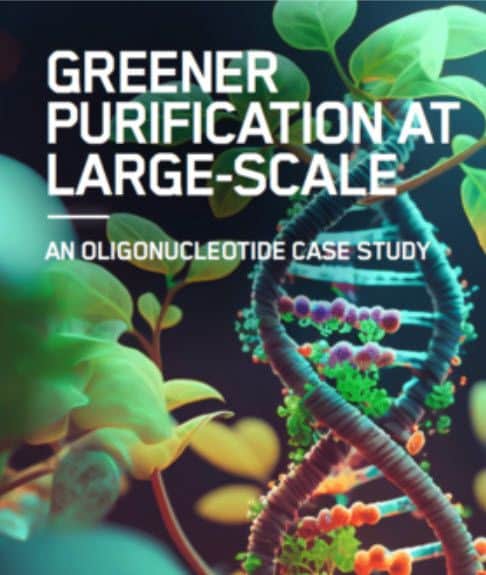The biopharmaceutical industry has seen a significant increase in interest in oligonucleotide-based drugs over the past five years. These drugs were originally used to treat rare diseases but are now being developed to target more common diseases and larger patient populations. The approval of the first-in-class siRNA for cholesterol reduction has boosted demand for oligonucleotide-based active pharmaceutical ingredients (APIs). This therapy has the potential to treat millions of patients annually and has increased demand for larger batch sizes and increased manufacturing capacity to support growth.
Pharmaceutical companies are under pressure to meet the growing demand for larger batch sizes of oligonucleotide APIs. The challenge is to develop a sustainable, environmentally friendly manufacturing process. Currently, the manufacturing process involves high solvent consumption and generates significant waste, particularly during the purification step. This limits large-scale production of these promising new therapeutics.
To overcome the challenges of large-scale production of oligonucleotide APIs, pharmaceutical companies are looking for a manufacturing partner that can:
- Reduce environmental impact by reducing solvent consumption and waste during purification
- Improve efficiency with higher throughput and productivity to accelerate manufacturing
- Increase yield with target purity
Continuous innovation is essential to improve processes for higher product quality, scale, cost efficiency and sustainability.
In oligonucleotide manufacturing, purification is a critical step to ensure the final product is pure and free of contaminants. Chromatography is the most efficient purification method, but it can result in high waste and material consumption, as well as long running times in large-scale production. Therefore, maximizing yield and quality while ensuring sustainability is critical in API production as it helps to improve efficiency, reduce costs and meet industry standards.
In oligonucleotide manufacturing, purification is a critical step to ensure the final product is pure and free of contaminants. Chromatography is the most efficient purification method, but it can result in high waste and material consumption, as well as long running times in large-scale production. Therefore, maximizing yield and quality while ensuring sustainability is critical in API production as it helps to improve efficiency, reduce costs and meet industry standards.
Continuous chromatography is A promising solution due to its high productivity, improved selectivity, and reduced costs
In large-scale production, the use of continuous processes is an effective solution to the challenges of maximizing yield and quality while ensuring sustainability. Bachem has implemented the world’s first Multicolumn Countercurrent Solvent Gradient Purification (MCSGP) system for center-cut purification on an industrial scale. This technology represents a major advance in the downstream processing of oligonucleotides. It typically results in higher capacity with lower solvent consumption and higher yield compared to conventional single-column batch purification. MCSGP is a scalable, cost-effective, and highly efficient process, particularly for large-scale production, as it operates 24/7 through an automated system, reducing purification cycle times. It is also a more sustainable process, reducing solvent consumption and process mass intensity. The use of standard chromatographic conditions in MCSGP does not affect the quality of the API, making it a technology that improves the capacity, quality, and sustainability of the purification process.
We work with our customers to address the sustainability and capacity challenges of oligonucleotide manufacturing by implementing unique engineering solutions in each piece of equipment. If you are interested in the benefits that MCSGP can bring to your project, please look at our case study.
Subscribe to our general newsletter
"*" indicates required fields

